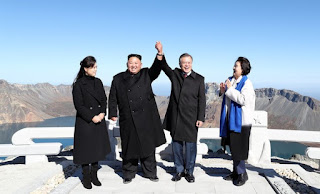Belated Election Round Up
Even this place voted Democrat
Wikipedia
actually has a pretty good summary of the results in English and if you can
read Hangul namu
wiki has a better run down so this will
be pretty brief.
Things that went as expected
1) Big victory for the Democrats.
They got 51% of the vote nationally (tbh a bit less than I
expected) with a 23% lead over the 2nd place Liberty Korea party.
They won 12 out of 13 national assembly special elections. Won all but 3 of the
races for Governors and Metropolitan Mayors (basically the governors of big
cities). They won 652 out of 824 of the seats in provincial assemblies and 1638
out of 2926 seats in county level elections (when rural, Liberty Korea
supporting areas get more seats). It is the most convincing win in a Korean
election since 1960. Even dictators who had complete control of the media,
rigged the elections and had no intention of giving up power even if they
somehow lost didn’t win by this much. They
even won in Gumi which was the birthplace of Park Chung-hee the military
dictator of Korea in the 60s and 70s who is still perhaps the most important
figure in the history of the Liberty Korea party and its predecessor parties
(his daughter was President until she was impeached in 2017). They have a big
statue of him, named their sports stadium after him and do ceremonies on his
birthday. But even they elected Democrats.
2) The crushing of the Righteous Future party
They got just 8% of the vote. Their biggest name Ahn
Cheol-soo (once the most popular politician in Korea) came third in the Seoul
mayor’s race with 19.6% of the vote. They didn’t come close in any of the
governor or big mayoral races. In fact they didn’t win any mayoral races and have just 5
provincial legislators and 21 local councillors.
Being a third party (or as they have now become a 4th party) in a mostly First Past the post system
is hard and to have any hope you of success need to have support that is highly
concentrated in specific geographic areas. 8% of the vote everywhere means zero
seats whereas 2% of the vote in most places and 40% in a few will win you a few
elections. For example the Liberal Democrats in the UK do well in the south
west of England, in ‘fringe’ areas of the UK (far Northern Scotland, very rural
bits of England and Wales) and incredibly wealthy areas with a liberal bent.
This concentration of support in specific areas means they always win at least
a handful of seats even when they poll in the single figures nationally.
However the Righteous Future party did equally badly everywhere which means
they were almost completely wiped out. In fact the Democracy and Peace party, a
centre-left split from the Righteous Future party managed to outperform their
former colleagues in seats despite getting far fewer votes. They got just 1.5%
of the vote nationally but this was all concentrated in Jeolla (south west area
which contains all the Democrats safest seats) and managed to win 5 mayoral races and 49 local councillors. What will add to the worries of the Righteous
Future Party is that the Liberty Korea party’s leader Hong Jun-pyo has
resigned. He is a walking, talking caricature
of a Liberty Korea politician who is seemingly designed to repel the
large chunk of Korean voters who do not belong to either of the main factions
in Korean politics. While it is not clear who the Liberty Korea party will
select next it is at least possible they could pick someone more appealing
to the swing voters and moderate conservatives who voted for Righteous Future
in 2018.
In National Assembly elections 47 out of 300 seats are
awarded via proportional representation and this looks being the only way the
Righteous Future Party will be able to secure seats in the future.
Something I didn’t
expect
The relative success of the Justice Party. They got 8% of
the vote making them Korea’s third biggest party and giving them the best
result of a party to the left of the Democrats since 2012. While the First Past
the Post nature of the elections meant they didn’t even come close in any of
the main elections and didn’t even mange to win a local mayoral race they did
win 11 provincial legislators seats (they didn’t win any 4 years ago) and 26
local council races (up from 11 4 years ago).



Comments
Post a Comment